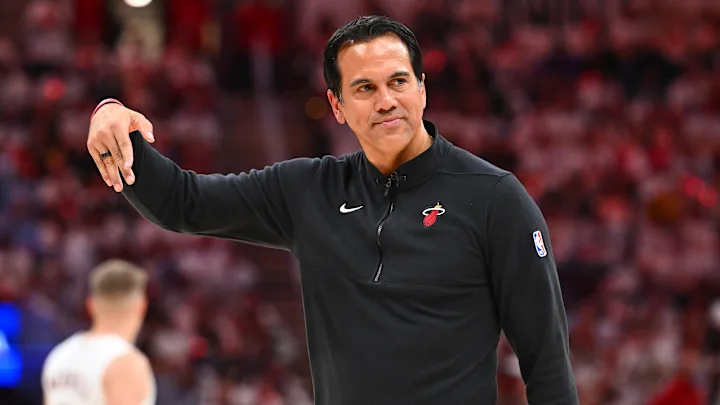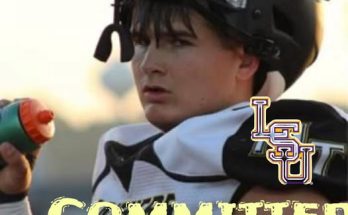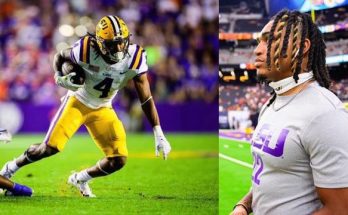The Miami Heat enter every NBA season with a familiar combination of skepticism from the outside and stubborn belief from within. Often overshadowed by flashier franchises or superstars with louder stat sheets, the Heat have built their modern identity on a different kind of currency—grit, culture, and consistency. After a disappointing 2024-25 season where injuries and inconsistency left them watching the Eastern Conference Finals from afar, the Heat face the upcoming campaign with a quiet but powerful confidence. And that confidence is rooted in one clear reason: continuity.
For all the movement in today’s NBA—superstars changing teams, rosters being flipped in an offseason, and coaches dismissed for falling just short—the Heat remain a beacon of organizational stability. Erik Spoelstra, now considered arguably the best coach in the league, will once again be leading the charge. Pat Riley, still pulling the strings upstairs, continues to oversee the franchise with an unmatched eye for long-term success. But more than just having the same faces in charge, the Heat’s belief in their foundational pieces—Jimmy Butler, Bam Adebayo, Tyler Herro, and a growing group of trusted role players—forms the bedrock of their argument to rise again.
At the heart of this continuity is a belief in process over panic. Miami didn’t overreact to their shortcomings last season. Despite persistent trade rumors and calls from fans for drastic changes, they held firm. Damian Lillard rumors swirled for months, yet the Heat didn’t gut their roster or overpay in a desperate chase. They didn’t sacrifice their future for a momentary leap forward. Instead, they doubled down on the core that took them to the NBA Finals in 2023 and the Eastern Conference Finals multiple times over the past five seasons.
This approach might be ridiculed in a league obsessed with splashy moves, but for Miami, it’s the fuel. Their players buy into a culture that doesn’t just value toughness and conditioning but demands it. Spoelstra’s schemes, predicated on defensive discipline and offensive adaptability, only work with smart, committed players willing to sacrifice ego for execution. That culture doesn’t get built overnight—it thrives on repetition, trust, and the kind of internal competition that turns undrafted players into playoff heroes. And that’s where Miami’s real advantage lies.
It’s easy to look at other teams in the East and be mesmerized by star power. The Celtics, with Jayson Tatum and Jaylen Brown. The Bucks, with Giannis Antetokounmpo and Damian Lillard. The Sixers, now armed with Joel Embiid and a healthy Tyrese Maxey. These rosters boast explosive potential, but they also face pressure to prove their cohesion in high-stakes moments. Miami, by contrast, has already walked that path together. They’ve been to war as a unit. They’ve won Game 7s on the road. They’ve beaten No. 1 seeds as underdogs. The Heat know who they are.
Jimmy Butler, despite injury concerns and age-related whispers, remains one of the most lethal postseason players in the game. His numbers in the regular season often undersell his true value, but come April, Butler transforms into “Playoff Jimmy”—a competitor who can control pace, draw fouls at will, and hit daggers in crunch time. He leads with an edge that infects the locker room and forces accountability. His leadership style might not be for everyone, but in Miami, it’s gospel.
Alongside him, Bam Adebayo has steadily matured into a defensive monster and an increasingly versatile offensive option. His ability to switch onto guards, defend the rim, and orchestrate from the elbow makes him one of the few true two-way bigs in the league. His quiet demeanor belies a competitiveness that Spoelstra regularly praises. Adebayo’s decision-making, midrange jumper, and assertiveness in the paint all took steps forward last season. As he enters his prime, the Heat believe he can anchor a top-five defense and be a 20+ PPG scorer.
Then there’s Tyler Herro, perhaps the most polarizing figure on the roster. Injuries have interrupted his development, and his absence during Miami’s deep 2023 Finals run raised questions about his long-term fit. But the Heat have never wavered in their support. They see Herro as a dynamic scoring option with improved playmaking and defensive awareness. He’s more than a heat-check shooter now—he’s a ball-handler who can operate in the pick-and-roll, create his own shot, and shift between on-ball and off-ball roles. If he stays healthy, Herro is poised for a breakout year that could silence many of his critics.
But Miami’s strength isn’t just in its top three players. It’s in the collective—the Max Struses, the Gabe Vincents, the Caleb Martins, and the Haywood Highsmiths of the world. Miami turns overlooked players into contributors through relentless development and a belief that basketball IQ and effort can level the playing field. They trust their system. They teach details. They demand physical fitness. And players respond because the Heat provide opportunity without politics. You earn your minutes in Miami.
This continuity extends to the bench and locker room leadership. Erik Spoelstra has earned the respect of every player who passes through the organization. His adaptability—whether it’s building zone-heavy schemes to mask weaknesses or installing an inverted offense through Bam—gives the Heat a tactical advantage. No matter the personnel, Spoelstra makes it work. But more importantly, he holds players accountable without losing them. His presence is part of why the Heat don’t splinter in adversity; they lean in.
The East is top-heavy again this year. Boston and Milwaukee will rightfully be seen as the teams to beat. Philadelphia may look rejuvenated under new leadership. Indiana and Cleveland are ascending. But every one of these teams has to prove it when it matters. Miami already has. The Heat don’t need to figure out who they are in the playoffs—they’ve been there and thrived. That gives them a mental edge, one rooted in continuity, chemistry, and confidence.
Critics will point to Miami’s age, offensive stagnation, or lack of a true second superstar. But this team has made a habit of defying convention. They don’t rely on one formula to win. They drag opponents into half-court battles, smother them on defense, and make just enough shots when it counts. They’re unbothered by seeding, having reached the NBA Finals from the Play-In. They don’t chase the No. 1 seed because they chase the moment. That’s the Heat DNA.
And there are signs they’ve learned from last season’s disappointments. Conditioning will be sharper. Depth will be re-evaluated. Emerging contributors like Jaime Jaquez Jr. and Nikola Jović are developing under the radar. The front office didn’t swing for a major star this summer, but they stayed nimble, retaining flexibility while doubling down on their core identity. That patience, often mistaken for passivity, is in fact a strategic choice rooted in belief. The Heat don’t need to reinvent themselves; they need to stay healthy and locked in.
If Butler, Bam, and Herro play 60+ games together, and Spoelstra continues to scheme at an elite level, Miami will be in every fight. And come playoff time, few teams in the East will be eager to see them. They’re a bad matchup for anyone. They muddy the game. They force stars into uncomfortable roles. They expose teams that rely on finesse over force. That’s why they always seem to find their way to the final four, even when the odds say they shouldn’t.
In a league where everyone’s searching for the next big thing, the Heat’s refusal to overreact is what sets them apart. Their one clear reason for believing they can return to the elite isn’t some new acquisition or radical change. It’s the fact that they already know who they are. And that unshakeable identity, forged over years of battles and belief, gives them the foundation to rise again. In a sport full of noise, Miami’s continuity is their quiet, unrelenting power.



